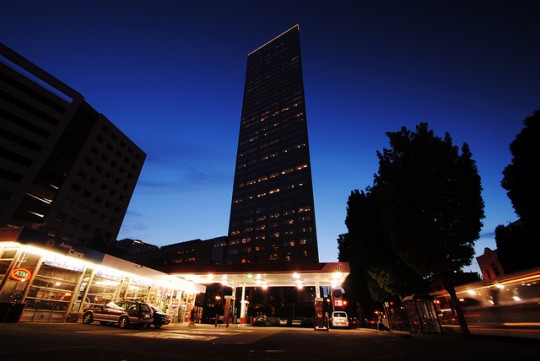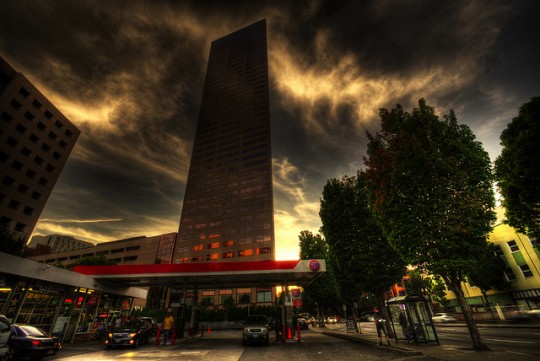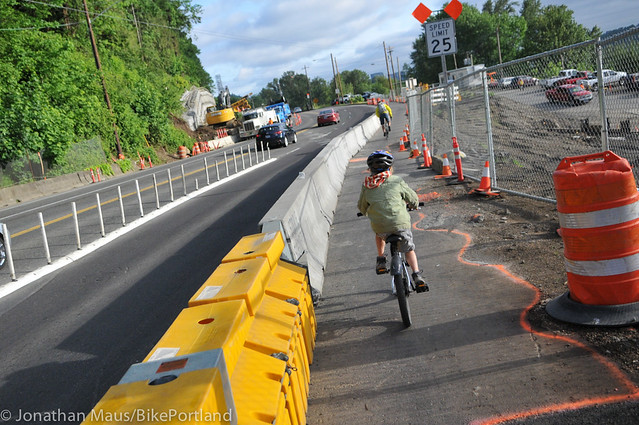
(Photo: C.M. Keiner)
Oregon’s 2015 legislative session is sure to include lots of plot twists for transportation policy. But at least among the key lobbyists, a grand bargain has been struck.
A group of advocates for biking, driving, urban density, public health, the gasoline industry, truck freight, rail fright, cities and public transit agencies — Oregon’s broadest-based organization of transportation interest groups — voted unanimously Thursday on the basic terms of a proposed transportation bill.
The deal brokered by members of the Oregon Transportation Forum would use a gas tax and/or auto fee hike to raise hundreds of millions of dollars over two years for infrastructure around the state.
Another $220 million or so would come out of the state’s general fund to support mass transit and off-road projects.
“SHARE COSTS FAIRLY: The State of Oregon should raise revenue from system users, as appropriate, based on the benefits they derive or the costs they impose on the system.”
— Oregon Transportation Forum consensus statement backing a possible gas tax hike
The group’s members also agreed to support making Oregon the first state in the country to let gas taxes automatically increase based not on inflation but on average motor fuel efficiency.
This would mean that as cars use less and less gasoline on average, the gas tax rate per gallon would rise even without further legislative action.
Last week’s agreement came two days after Oregon voters widened Democratic margins in both the state House and Senate, bringing the party close to the supermajorities required to raise taxes under state law — though not enough to pass a gas tax hike with zero Republican votes.
It also came as gas prices have fallen near a four-year low.
The current state tax is 30 cents per gallon; the federal gas tax is 18.4 cents. By law, state fees and taxes on driving can only be spent on road infrastructure, which includes bike lanes and sidewalks as well as big-ticket items like building freeways or repaving streets.
Metro lobbyist Randy Tucker shared the terms and working text of the agreement in an interview Thursday, and Bicycle Transportation Alliance Advocacy Director Gerik Kransky forwarded the working text of the terms. (Tucker and Kransky said the terms had been edited only slightly before Thursday’s vote, adding details to a youth transit provision. Update 1:45 pm: Here’s the text of the agreement as approved, including the revised YouthPass language.)
Terms of the proposal

(Photos: J.Maus/BikePortland)
Here’s the basic outline of the deal:
An unspecified combination of gas tax hikes and/or auto fees that would raise about as much over two years as the $300 million, six-cent gas tax hike Oregon approved in 2009. This increase would go toward both maintenance and new construction at the state, county and city levels, with maintenance as the “first priority.”
An additional one-cent-per-gallon gas tax hike that would be dedicated exclusively to allowing jurisdictional transfers of state-owned roads. This would raise an estimated $26 million annually that could be invested in bringing state roads up to local standards, allowing the state to offload control of so-called “orphan highways” (along with future maintenance costs) to cities and counties that want them. (We reported Friday that 82nd Avenue could be a key target for this provision.)
Indexing the state gas tax to average vehicle fuel efficiency, but not to inflation. (Kransky said every member of the coalition except one had supported indexing to inflation as well as efficiency, and that some would be lobbying for inflation indexing on their own time.)
$75 million over two years to support transit for seniors and people with disabilities, such as TriMet’s federally mandated door-to-door LIFT program. Because the state constitution forbids fees or taxes on driving to be spent on public transit, this would have to come out of the state’s general fund.
Advertisement
$23 million to preserve Amtrak Cascades service between Eugene and Portland, which would otherwise be eliminated amid declining federal subsidies. This is another general fund request.
$20 million over two years for youth-oriented transit programs around the state. This would restore state funding for YouthPass, the free universal transit passes that have been offered to Portland Public Schools high schoolers and a few other districts around the state in lieu of a yellow-bus program. It would also expand funding for other school districts who choose to use such programs. Again, this money would come out of the state’s general fund.
$100 million for the next round of Connect Oregon projects, which are set aside for non-road-related projects of statewide economic significance. Like last year, biking and walking projects would be eligible to compete for these grants along with public transit, rail, marine and airport projects. Connect Oregon has traditionally been paid for by bonding against future state lottery revenues.
Tucker said the group, on which he sits as a representative for the Metro regional government, had deliberately avoided specifying dollar figures for the amount to be raised by the gas tax or registration fee. Like all the figures above, those sums will be subject to negotiation with and among legislators.
Tucker also noted that the four general fund requests will be very hard to secure in full, because they will have to compete for money with schools and social services.
The agreement doesn’t explicitly associate any sort of project list with the new road revenue. Any state-level gas tax increase would also increase revenue to Portland and other local governments, who receive distributions of state gas taxes based on their number of registered automobiles.
State gas tax hike would increase local road funding
During Portland’s continuing discussion about a proposed per-household transportation tax or fee, Mayor Charlie Hales and other officials have opposed a local gas tax but called repeatedly for gas tax hikes at the state and federal level, saying the city can’t pay for all its transportation needs without such hikes.
Oregon created the country’s first gas tax in 1919, but has never tied it to inflation. As of September, eight states and the District of Columbia index gas taxes either to general inflation, to gas prices or to road costs. Massachusetts lawmakers agreed to begin indexing this year, but last week voters there overruled that decision.
BTA Advocacy Director Gerik Kransky said Sunday that the BTA had worked hardest for Connect Oregon to continue including biking and walking projects.
“We obviously have been working behind the scenes for months to be sure that was included,” Kransky said.
The other key provisions that drew BTA support were the calls for public transit funding for seniors and teens. Those have been backed by an informal alliance of nonprofits that support low-car transportation, including the BTA.
Kransky said the BTA will also be angling for the state transportation department to categorize bike lanes and sidewalks along existing roads as “fixing” the system rather than as expanding it.
“We don’t think active transportation infrastructure is additive to our streets,” Kransky said. “We think it’s integral.”
Tucker called the Oregon Transportation Forum proposal “the starting point for discussion.”
“The legislature will accept this in the spirit in which it is offered, I think, and then they will do what they do,” he said.
Correction 8:30 am: A previous version of this post incorrectly described the size of the gas tax hike approved in 2009.



